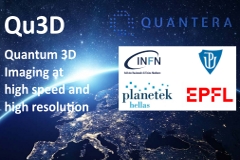Qu3D project (Quantum 3D Imaging at high speed and high resolution) aims at designing and implementing radically novel 3D imaging devices, quantum plenoptic cameras, which exploit quantum correlation phenomena between photon pairs to enable the typical refocusing and ultra-fast, scanning-free, 3D imaging capability of microscopy plenoptic devices, but with enhanced performances in terms of spatial resolution (diffraction-limited), large depth of focus (DOF) and ultra-low noise.
Key elements are world-class single-photon sensor arrays, as well as the challenging aspect of speeding-up acquisition and elaboration of a large amount of data exploiting high-performance computing and parallel processing on GPU.
Cutting-edge techniques such as compressive sensing, machine learning, and quantum tomography algorithms will be explored in this project.
Based on the relevant scientific, industrial, and societal potential of high-speed 3D imaging at high resolution and low noise, the results of Qu3D are expected to generate novel imaging and diagnostic tools, in many branches of science: quantum plenoptic microscopes and endoscopes for biophotonics and biomedical imaging, quantum space imaging devices, quantum 3D cameras for both security and industrial inspection applications. The research is thus expected to open new scientific and technological possibilities, and to play a transformational role in technology and society.
The Qu3D project led by INFN (Istituto Nazionale di Fisica Nucleare, Italy) includes Planetek Hellas (Greece), Palacky University Olomouc (Czech Republic), and Ecole Polytechnique Fédérale de Lausanne (Switzerland). It is funded within the QuantERA framework. QuantERA is a network of 32 organizations from 27 countries, coordinated by the National Science Centre, Poland, supporting international research projects in the field of Quantum Technologies (QT).






